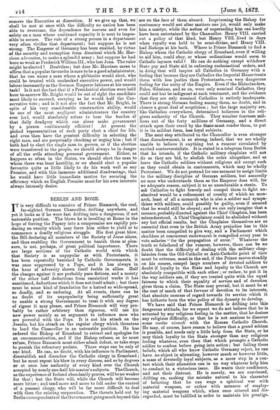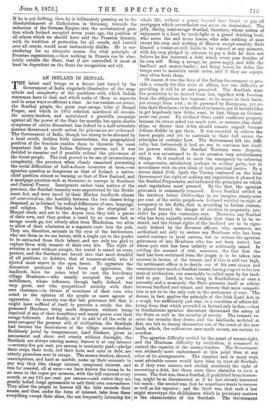BERLIN AND ROME.
17 is very difficult to conceive of Prince Bismarck, the cool,
far-sighted German Chancellor, drifting anywhere, and yet it looks as if he were fast drifting into a dangerous, if not untenable position. The blows he is levelling at Rome in the hope of forcing the Papacy into a compromise are rapidly pro- ducing an enmity which may force him either to yield or to commence a deadly religious struggle. His first great blow, the Bill declaring all members of the Society of Jesus aliens, and thus enabling the Government to banish them at plea- sure, is not, perhaps, of great political importance. There are large sections of the Catholic world with which that Society is as unpopular as with Protestants, it has been repeatedly banished by Catholic Governments, it was once suppressed by a Pope, and it has always in the hour of adversity shown itself feeble in allies. Half the charges against it are probably pure fictions, and a moiety of the other half deductions from casuistical works it has sanctioned, deductions which it does not itself admit ; but there must be some kind of foundation for a hatred so wide-spread, so deadly, and so enduring. At all events, there can be no doubt of its unpopularity being sufficiently great -to enable a strong Government to treat it with any degree of rigour it may please, and Prince Bismarck will very pro- bably be rather arbitrary than rigorous, will use his new power mainly as an argument to influence men who are powerful with the Pope. It is not his attack on the Jesuits, but his attack on the regular clergy which threatens -to land the Chancellor in an untenable position. He has ordered the Bishop of Ermeland to retract and apologise for an excommunication, and if the Bishop refuses, as he must refuse, Prince Bismarck must either admit defeat, or take steps to punish the refractory prelate. Those steps can be only of one kind. He can, no doubt, with his influence in Parliament, disestablish and disendow the Catholic clergy in Ermeland ; but he must repeat his blow in every diocese, and so by degrees or at once lose authority of every kind over the Church accepted by nearly one-half his master's subjects. The Church, as the experience of Ireland abundantly proves, willbe no weaker for that ; but the State will, while the Church will become more bitter ; and tend more and more to fall under the control of a peasant clergy, who will be far more difficult to deal with than the existing corporation. The threats held out by Berlin correspondents of the Government going much beyond this are on the face of them absurd. Imprisoning the Bishop for contumacy would not alter matters one jot, would only make him a martyr, while the notion of superseding him can hardly have been entertained by the Chancellor. Henry VIII. carried out a policy of that kind, but Henry VIII. lived in days when royalty was held to be semi-divine, and Henry VIII. had Bishops at his back. Where is Prince Bismarck to find a Bishop whom the Catholic clergy of Ermeland, even if willing to aid him, could obey, or whose ordinations would seem to Catholic laymen valid He can do nothing except withdraw State pay and State aid in enforcing ecclesiastical orders, and in doing that will inspire all Catholics in Germany with a feeling that because theyare Catholics the Imperial House treats them with less justice than Protestants,—,a very dangerous feeling for the unity of the Empire. Even if the Rhinelanders, Poles, Silesians, and so on, were only nominal Catholics, they could not but be indignant at such treatment, and the evidence that they are only nominal Catholics is entirely inadequate. There is strong German feeling among them, no doubt, and in classes a great deal of scepticism ; but the large majority are, like Catholics everywhere, determined believers in the reli- gious authority of the Church. They number fourteen mil- lions out of the forty millions of Germany, and a direct attack upon their creed by the State must render them, to put it in its mildest form, law loyal subjects.
The next step attributed to the Chancellor is even stronger than disendowment, is so strong, indeed, that we are wholly unable to believe it anything but a rumour circulated by excited controversialists. It is stated in a telegram from Berlin that he intends, if the Catholic military chaplains will not do as they are bid, to abolish the order altogether, and so leave the Catholic soldiers without religious aid except such as they could obtain in cantonments, which may be wholly Protestant. We do not pretend for one moment to assign limits to the military discipline of German soldiers, but assuredly no man who understands them as the Emperor does will, for no adequate reason, subject it to so unendurable a strain. To ask Catholics to fight bravely and compel them to fight un- absolved would be a refinement of cruelty of which no mon- arch, least of all a monarch who is also a soldier and sympa- thises with soldiers, could possibly be guilty, even if assured that he would still be obeyed; and we can only imagine that a menace, probably directed against the Chief Chaplain, has been misunderstood. A Chief Chaplaincy could be abolished without any but official results, but the Chaplains themselves are so essential that even in the British Army prejudice has in this matter been compelled to give way, and a Parliament which shudders at concurrent endowment is compelled every year to vote salaries "for the propagation of error." Whatever the truth or falsehood of the rumour, however, there can be no doubt that the difficulty of dealing with the military chap- laincies from the Old-Catholic or Anti-Catholic point of view must be extreme, must in the end, if the Prince moves steadily on his course, compel large numbers of devoted soldiers to doubt if loyalty to the State and loyalty to the Church are absolutely compatible with each other ; or rather, to put it in the way soldiers use, if they are treated quite with the equal fairness to which their equality of service and of devotion gives them a claim. The State may prevail, but it must be at the cost of much of that fervour of devotion to its interests, that absolute oneness of regard towards its service which it has hitherto been the wise policy of the dynasty to develop.
We have said that Prince Bismarck is drifting into this dangerous attitude, for we repeat we do not believe that he is actuated by any religious feeling in the matter, that he desires any religious difficulty, or that he is not anxious to discover some modus vivendi with the Roman Catholic Church. He may, of course, have reason to believe that a grand schism is possible, and needs only a little help from the State, or he may think loyalty to the State stronger than any religious feeling whatever, even than that which prompts a Catholic soldier to confess before going into action ; but failing these beliefs, which all who know Catholic Germany reject, he can have, no object in alienating, however much or however little, a mass of devotedly loyal subjects, as a mere step in a con- test which their alienation can in no way whatever help him to conduct to a victorious issue. He wants their confidence, and not their distrust. He is merely, we are convinced, drifting on, making the mistake natural to his character of believing that he can wage a spiritual war with material weapons, or rather with menaces of employ- ing material weapons which, when once uttered and dis- regarded, must be fulfilled in order to maintain his prestige. If he is not drifting, then he is deliberately pressing on to the disestablishment of Catholicism in Germany, towards the reduction of the German Empire into the ecclesiastical posi- tion which Ireland occupied seven years ago, the position of all others which we should have said the Prussian dynasty, with its tradition of protection for all creeds, and control over all creeds, would most instinctively dislike. He is sur- rendering for no adequate reason the vital principle of Prussian organisation,—that nothing in Prussia can be abso- lutely outside the State, that if not controlled, it must at least be dependent on the State for recognition and aid.



































 Previous page
Previous page